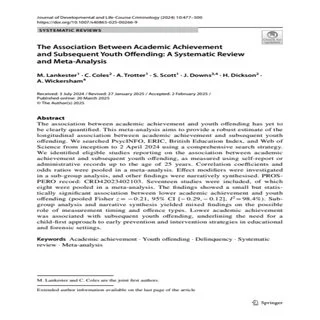By M. Lankester, C. Coles, A. Trotter, S. Scott, J. Downs, H. Dickson & A. Wickersham
The association between academic achievement and youth offending has yet to be clearly quantified. This meta-analysis aims to provide a robust estimate of the longitudinal association between academic achievement and subsequent youth offending. We searched PsycINFO, ERIC, British Education Index, and Web of Science from inception to 2 April 2024 using a comprehensive search strategy. We identified eligible studies reporting on the association between academic achievement and subsequent youth offending, as measured using self-report or administrative records up to the age of 25 years. Correlation coefficients and odds ratios were pooled in a meta-analysis. Effect modifiers were investigated in a sub-group analysis, and other findings were narratively synthesised. PROSPERO record: CRD42023402103. Seventeen studies were included, of which eight were pooled in a meta-analysis. The findings showed a small but statistically significant association between lower academic achievement and youth offending (pooled Fisher z = − 0.21, 95% CI [− 0.29, − 0.12], I2 = 98.4%). Sub-group analysis and narrative synthesis yielded mixed findings on the possible role of measurement timing and offence types. Lower academic achievement was associated with subsequent youth offending, underlining the need for a child-first approach to early prevention and intervention strategies in educational and forensic settings.
J Dev Life Course Criminology 10, 477–500 (2024)



